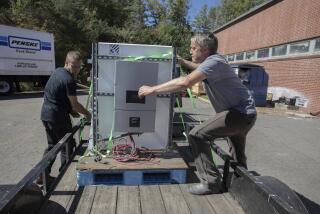For Some, Power Fiasco Really Is a Crisis
Irritating, isn’t it, to sift through this electricity crisis? You read as much as you can in the papers, watch some TV, listen to the governor. You’ve got to figure out who’s at fault and what expenses you’ll cut to pay the extra five, 10 or 20 bucks a month or whatever in increased utility bills.
Oh, the maddening dynamics of flawed deregulation.
There’s another group of Orange County residents that couldn’t care less about who’s at fault. They don’t read the papers or watch that much TV news. They’re not interested in gab sessions about energy wholesalers and legislative committees.
They’re interested in this decision: Do we keep the lights on or buy groceries?
Those are the people Karen McGlinn sees every day at the Share Our Selves center in Costa Mesa. They’re the working poor or low-income elderly to whom there’s no such thing as a modest increase in their bills.
“They deal with so many day-to-day issues, I’m not sure they’re abreast of the energy crisis,” McGlinn says. “You and I will talk about it, grouse about it, question whether it’s political, whether someone is profiting, but we’ll pay the bill. The population I see, they’re very vulnerable. They’re not thinking about that.”
McGlinn, the executive director at the privately funded Share Our Selves, then makes another point that separates most of us in affluent Orange County from her clientele.
Something as mundane as a bump in a utility bill, she says, can affect their security.
Come again?
For a senior citizen, McGlinn says, lights can mean home security. Likewise, if a senior turns down the heat, it may affect his or her physical or mental health. When you’re older, being warm often makes you feel better.
“If they have to decide they can’t, because they can’t afford to pay that bill,” McGlinn says, “they can have a real sense of loss to their self-worth, their being.”
*
The stories are equally poignant for low-income families.
McGlinn remembers in years past some mothers coming to the center for financial assistance because their “lights [had] been turned off at home, and they [couldn’t] bear the thought of their children being cold and coming home from school and having no lights. It’s almost like they became naked, so exposed [by] their vulnerability.”
Although Share Our Selves offers medical and dental care, it is best known as a food bank. Last year, it distributed 55,000 to 60,000 bags of food, McGlinn says.
McGlinn suspects that many of her clientele won’t even be aware of the electrical “crisis” until they see their first utility bill with a spiked payment.
To them, heat and light, food, clothing and shelter are the name of the game.
“Their lives are such that anything can rock their stability,” she says. “If their energy bill is $45 a month now--and that’s pretty much the average of what we see--and it would go to $65. . . . To you and I, $20 is not a lot of money anymore. But to a service worker, that’s a lot.”
And if parents can’t provide basics for themselves and their children, “it undermines their self-confidence and often creates conflict in the home,” McGlinn says.
This is why McGlinn frets about the current crisis.
“It’s just really hard for most of us to try and understand what it’s like to live on $1,600 a month,” she says. “If you had to pay rent and utilities and food and get clothes and have transportation expenses and medical expenses. . . . It’s almost unfathomable to us.”
This is also unfathomable in affluent Orange County: “I’ve known families that have used one lamp to light a whole house,” McGlinn says. “The parents moved it from room to room. I met a woman whose bill was so low that I asked her about it. She said the children were allowed to watch TV one night a week, for an hour or two, and when they had it on, they don’t turn on any other lights in the house.”
These tales aren’t told to drum up sympathy.
They’re told to suggest that the story of who did what to create California’s electricity mess doesn’t just involve big-name players like the governor, utility company CEOs and big businesses.
Instead, the story line features far too many unknown players--all playing the role of victims.
*
Dana Parsons’ column appears Wednesday, Friday and Sunday. Readers may reach Parsons by calling (714) 966-7821, by writing to him at The Times’ Orange County edition, 1375 Sunflower Ave., Costa Mesa, CA 92626, or by e-mail at dana.parsons@latimes.com.


